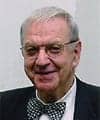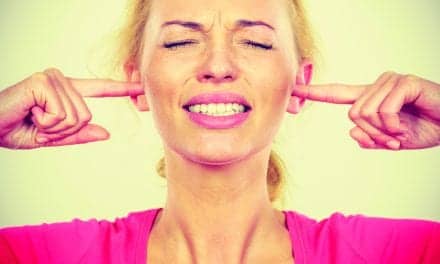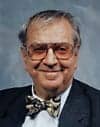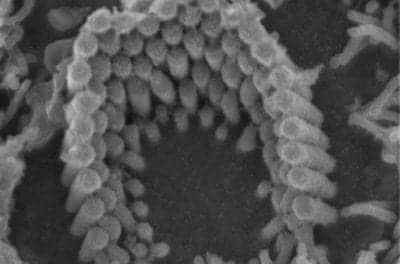Blog | Opinion
By Maurice H. Miller, PhD
I was home this morning working on completion of some unfinished papers when a TV commercial announced they had finally come to a solution to the perennial problem of providing definitive relief from tinnitus: Lipoflavonoids! Apparently, lipoflavonoids are not only the solution but “highly recommended by ear doctors.”
Now I confess that I am not sure what “ear doctors” refers to. Am I, for example, a Board Certified (AAA) Audiologist qualified to call myself an “ear doctor?” Can an audiologist meet their criteria? Are they referring to Board Certified Otolaryngologists-Head and Neck Surgeons? What about Board Certified ENT’s whose practice is limited to the nose and throat? Are they qualified?
Reviewing some more assorted materials online, I was happy to learn that “if you suffer from ringing, buzzing, or humming in your ears, help has arrived.” The global leader in hearing health technology has engineered a new Tinnitus Treatment Solution designed to forever change the way people deal with their tinnitus problem. Using patent-pending tinnitus technology, they claim this comfortable and nearly invisible device creates a customizable sound stimulus that you and a tinnitus hearing professional can fine-tune to soothe the irritating sounds you now hear. They claim “you can take control of your tinnitus instead of letting it control you.”
Following this promise of control is a photo of a “behind the ear” hearing aid. This is the device that is “small and comfortable to wear.” The Tinnitus Treatment Solution is designed to deliver all-day relief from ringing in your ears.
So may I respectfully ask what if I also have and am most disturbed by my tinnitus at night when it is less masked by environmental sounds. Does it work then?
Many of these ads keep referring to “professionals.” Who are they, and what or who makes them competent? What professional training have they received to deal with this widespread problem?
Tinnitus, of course, can and often is associated with many causes, including but not limited to prior or existing noise exposure, a wide variety of medications, including aspirin, and even aging and/or presbycusis. Patients with or suspected of having any of these or related problems should be seen by a medical professional—an otolaryngologist specializing in ear and hearing problems (rather than one whose primary interest is nasal surgery) and/or an audiologist.
Tinnitus patients should first be assured that no tumor of the auditory nerve or surrounding structures is present. Patients with such conditions often report unilateral tinnitus as the first sign of the problem. Granted, these are rare cases, but the seriousness of the condition warrants care when instructing consumers. In some cases, an MRI or C-scan may be part of the evaluation, when indicated.
Hearing aids have been shown to be one of the most effective treatments for a large population of people with tinnitus. However, hearing aids do not help all people and are essentially useless during bedtime—when tinnitus can become the most bothersome and worrisome, further increasing the patient’s anxiety level.
In my view, professionals who are dispensing hearing aids to treat tinnitus problems should have at least some specialized training in this area, and also become knowledgeable about recommending a continuum of options that can range from hearing aids, to counseling, to buying a fan, to obtaining a dedicated tinnitus sound generator and treatment program.
Tinnitus, while often associated with hearing loss, may also be an early and significant sign of a potentially serious health problem; it should not be ignored or minimized. Tinnitus suppression devices are now widely advertised, but the significance of tinnitus as a warning sign of an “ear in distress” must not be forgotten or ignored. Tinnitus diagnosis should precede treatment.

Let us know your opinion in the comments section below, or send correspondence to Dr Miller at: [email protected]





Very nice blog thank you for sharing with us.
I know How tinnitus irritates one who facing the problem. Thank you so much for sharing the info on that.
Hi , great article, I’d love to know your thoughts on where the likes of transcranial magnetic stimulation may be headed as a possible solution seeing as though a cure looks far off.
In my opinion, tinnitus is an area of hearing healthcare that too often has a large number of unproven “remedies” designed mostly to part desperate people from their cash. There are a few proven and medically recommended courses of action for helping relieve tinnitus, including hearing aids, sound therapy, and cognitive behavioral therapy, as detailed by the clinical practice guidelines issued by the American Academy of Otolaryngology-Head and Neck Surgery (AAO-HNS). Dietary supplements (eg, ginko-biloba), anti-depressants, and transcranial magnetic stimulation are specifically NOT recommended in these guidelines. The guideline recommendations did not come out in favor or against the use of acupuncture. You can find the pertinent part about clinician treatment recommendations by AAO-HNS toward the end of the guidelines document. Hearing Review’s summary of the guidelines can be found here. Another source of information is the American Tinnitus Association, and their website includes a list of professional resources.
I just felt like i should share my experience with tinnitus. I had tinnitus for over 6 years and in those years I lost concentration, sleep, etc. Everything was so loud and unbearable. I was read a testimony online on how someone was cured of tinnitus, and i contacted the doctor and told him all i was facing. He told me about his treatment and sent me his medication–it was herbal. In 3 weeks i was cured now i can sleep and hear without anymore sounds disturbing me in the ear. You can try to contact him on his personal mailbox: [email protected].
Please Note: The Hearing Review and its staff do not endorse any of the products or treatments listed here by those who post comments, but we share them with our readers in the hope that the information is helpful.
I really enjoyed your article, as I, myself have tried several of these so called “miracle cures.” I feel when you present your problems to most doctors it is dismissed as it seems to be more of a nuisance to them. I had been living with tinnitus since my senior year of high school in 2003 and as a nurse I have done my fair share of research. I would like to let people know of a website I found that has helped me tremendously. If this is not allowed please let me know, but for all the sufferers out there, I would like to let them know there are people who care and are doing impressive things towards finding relief from tinnitus. The website is called THE Tinnitus Test, just look and read for yourselves and see what you think. https://www.thetinnitustest.com
Hi Kaylee,
Thanks for sharing your experiences with tinnitus (and relief!) here. We’re posting your comment for our readers with the caveat that The Hearing Review cannot endorse or comment on any third-party products or services that are listed here. However, we share the link and information you have provided in the hope that other readers find it helpful. As always, thanks to you and all for joining the conversation!
I had tinnitus for almost two years. It’s almost gone completely now. How I did it? I remove emotional stress from my heart. That is that simple! Before this, I had tried many things to get rid of it but none of them worked. I had tried enzymes, changing my diet and increased time of exercise but did not see any result.
I was introduced to a book written by Dr. Tien-Sheng Hsu, The Secret to Healing Cancer. From reading this book I learned a very new concept that our disease is caused by our depressed, distorted emotions, not by physical body. I started to look back my life and face the pain in my heart. I started to see how hopelessly I had felt for a long time and started to take a new turn for my life. By doing this, I take back the power for my life. I recognized my stress and removed it from my life. After about one month, my tinnitus is almost completely gone. My left ear was deaf because of the noise in my left ear. Now it is clear and I am able to hear again. I hope my experience can encourage anyone who has ear ringing to keep trying, not to give up.
Totally agree with the comments…Great read…Unfortunate that such ads can be placed to mislead individuals who already are suffering from the condition.
Raji
This is a great article and I am right behind you when you suggest that we should beware the latest miracle cure, pill, potion or device that will change our tinnitus for good. To date there is nothing that works for all, for some I suspect that the “magic cures” are at best exhibiting a placebo effect.
The best thing you can do is to get on with your life and learn how to ignore your tinnitus. And that is exactly what I help my clients to do, to learn how to push their tinnitus into the background. To help them start this journey I give them my 3 Top Tips To Combat Tinnitus eBook which they can download for free from my website.
Thank you for your comment, Graham. We are obligated to add the note that The Hearing Review cannot endorse any products or services mentioned in comments on our website, but we sometimes publish such comments in the interest of offering different points of view on our articles and/or information that may possibly be helpful to our readers.
How many doctors or specialist, who are working on avenues to treat/cure tinnitus, are tinnitus sufferers? Nothing like knowing first hand, what others are going through.
My tinnitus, started out sounding like little electronic beeps/sequences. It eventually turned into one long beep/tone. Maskers help, but as noted in this article, sleep is a problem. Tiring myself out almost to the point my body could care less about the noise is usually the way I go to sleep. Add to this, I’ve been ADHD all my life, lol. Passive meditation is tuff to do. So rely on active meditation to destress, which helps the tone reduce. Oddly enough, my tinnitus diminishes alot if I’m in a building or place with no phone signal. Anyone else come across this?
Interesting article. I wish that the doctor had gone into more detail about what exactly lipoflavonoids are, and why they are not effective for tinnitus. My father had this problem, I developed it in my mid forties, and two of my 5 adult children are also affected. It becomes increasingly loud for us when stress is experienced. I hope that one day, a physician will take enough interest in this problem and begin serious research.
Very good article about tinnitus!
Great article for understanding tinnitus better.
Great article, I know that most people have concerns that tinnitus treatment products will not work and fully resolve the problem, but there are actually plenty of them on the market and I have personally checked most of them. Thanks again for the article.
Thank you, excellent article. Many tinnitus sufferers remain under-served as they are surrounded by claims of “miracle cures”, “guaranteed results”, or (equally disheartening) messages of “don’t bother trying, nothing can be done.” Proper diagnosis, qualified clinicians, and access to a range of treatment options can do much to help.
really great article for tinnitus.
Useful article. I have had a ringing noise in my ear for a while now (very annoying). I searched online for a solution and came across a book on http://www.wje592.com/alternative-tinnitus-remedies/ . I really enjoyed this book because it is straight to the point. A lot of other books have a lot of filter information and I have to spend a long time reading before I get to start implementing the tips. Fortunately, I was able to get rid of the ringing right away, and am really grateful for this.
Never stop looking for the treatment you want.
Thanks for your comments, Marianne. We’d like to inform Hearing Review readers that our publication does not endorse products or materials, but we sometimes post comments from our community that may mention or promote such products in the spirit of sharing information and different points of view.